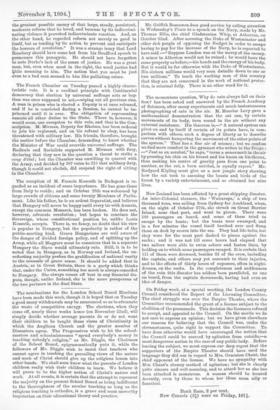The reception of M. Francis Kossuth in Budapest is re-
garded as an incident of some importance. He has gone there from Italy to reside ; and on October 28th was welcomed by large crowds of citizens and some twenty Members of Parlia- ment. Like his father, he is an ardent Separatist, and believes that Hungary will never be happy until every tie with Austria, .except the common Monarch, has been broken. He does not, however, advocate revolution ; but hopes to convince the Sovereign, whose constitutional position he, unlike Louis Kossuth, accepts. There is, we fancy, no doubt that his view is popular in Hungary, but the popularity is rather of the public-meeting kind. Grave Hungarians are well aware of the danger of divided foreign policy, and of splitting up the Army, while all Magyars must be conscious that in a separate Hungary the Slays would ultimately rule. Still, it is to be noted that in. Hungary, as in Norway and Ireland, the un- reflecting majority prefers the gratification of national vanity to the counsels of grave sense. It should be added that in Austria, as in Great Britain, there is a party which thinks that, under the Union, something too much is always conceded to Hungary. She always comes off best in any financial dis- pute, though, unlike Ireland, she is the more prosperous of the two partners in the dual State.


















































 Previous page
Previous page